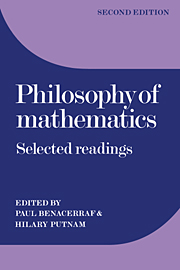Book contents
- Frontmatter
- Contents
- Preface to the second edition
- Introduction
- Part I The foundations of mathematics
- Part II The existence of mathematical objects
- Empiricism, semantics, and ontology
- On platonism in mathematics
- What numbers could not be
- Mathematics without foundations
- Part III Mathematical truth
- Part IV The concept of set
- Bibliography
On platonism in mathematics
Published online by Cambridge University Press: 05 June 2012
- Frontmatter
- Contents
- Preface to the second edition
- Introduction
- Part I The foundations of mathematics
- Part II The existence of mathematical objects
- Empiricism, semantics, and ontology
- On platonism in mathematics
- What numbers could not be
- Mathematics without foundations
- Part III Mathematical truth
- Part IV The concept of set
- Bibliography
Summary
With your permission, I shall now address you on the subject of the present situation in research in the foundations of mathematics.
Since there remain open questions in this field, I am not in a position to paint a definitive picture of it for you. But it must be pointed out that the situation is not so critical as one could think from listening to those who speak of a foundational crisis. From certain points of view, this expression can be justified; but it could give rise to the opinion that mathematical science is shaken at its roots.
The truth is that the mathematical sciences are growing in complete security and harmony. The ideas of Dedekind, Poincaré, and Hilbert have been systematically developed with great success, without any conflict in the results.
It is only from the philosophical point of view that objections have been raised. They bear on certain ways of reasoning peculiar to analysis and set theory. These modes of reasoning were first systematically applied in giving a rigorous form to the methods of the calculus. [According to them,] the objects of a theory are viewed as elements of a totality such that one can reason as follows: For each property expressible using the notions of the theory, it is [an] objectively determinate [fact] whether there is or there is not an element of the totality which possesses this property.
- Type
- Chapter
- Information
- Philosophy of MathematicsSelected Readings, pp. 258 - 271Publisher: Cambridge University PressPrint publication year: 1984
- 8
- Cited by

